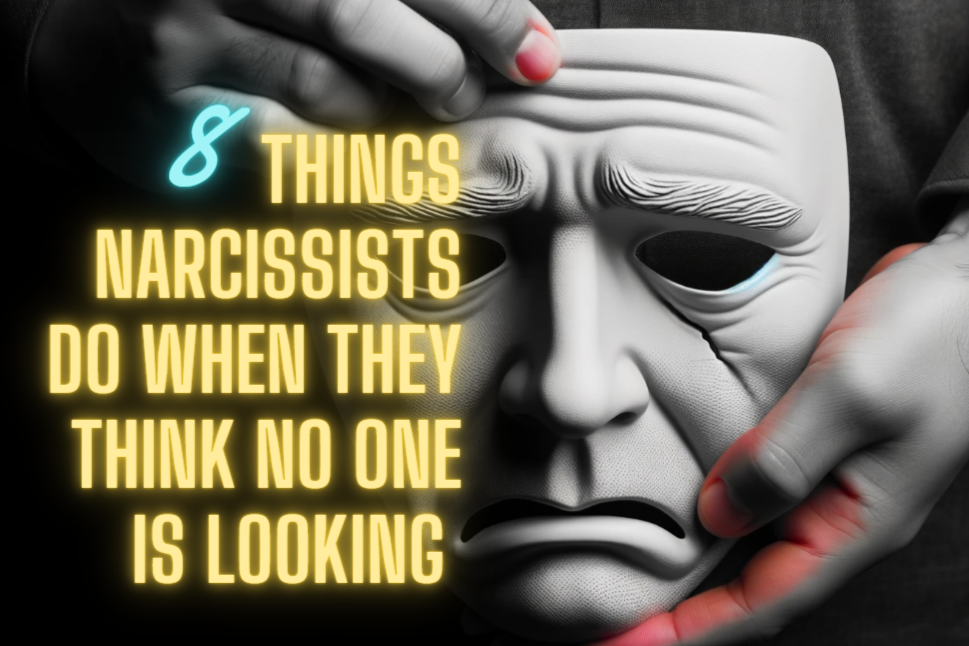Introduction
Narcissism, huh? It’s more than just loving the reflection in the mirror. Actually, it’s a complex personality trait that’s often misunderstood. A narcissist isn’t just someone who’s into themselves; they often engage in a series of behaviors that can be downright confusing, and sometimes harmful.
Generalizations and stereotypes? They don’t help much. To really get what’s going on with a narcissist, it’s important to understand the underlying behaviors, especially the sneaky stuff they do when they think nobody’s watching. So let’s dive in and unravel these complexities, without the judgment or the drama. It might be eye-opening to see things narcissists do when they think no one is looking!
Manipulating Others Behind the Scenes
Manipulation is like second nature to a narcissist. It’s not about the grand gestures or over-the-top drama, though. It’s the small, behind-the-scenes moves that can really leave a mark. Picture someone pulling strings, gently nudging people this way or that, all to gain power and control. It might be a well-placed compliment here, a small criticism there. It’s all calculated, and it’s all aimed at getting what they want.
Of course, the best manipulators make it look easy, like they’re not even trying. But make no mistake, there’s often a lot going on under the surface, and it’s rarely about anyone’s best interests but their own. It’s a tough topic, but understanding these subtle manipulations can shed light on a complex behavior that’s sometimes hard to spot.
Building a False Image Online
Ever stumble across a social media profile that seems too good to be true? With a narcissist, that’s often the case. The online world is a playground for them to craft this perfect image. Shiny cars, flawless selfies, humblebrags about success—you name it. It’s not just about looking good; it’s about looking better than everyone else.
But here’s the kicker: that online persona often doesn’t match up with the real person. Offline, they might struggle with relationships, or their career might not be as rosy as they portray. The divide between the virtual and the real can be wide, indeed.
It’s not about bashing anyone’s online presence, but recognizing how a narcissist uses the web to weave an idealized version of themselves. It’s clever, it’s captivating, and yes, it’s a bit deceptive. But understanding this duality helps to make sense of the seemingly perfect people behind the screens. It’s a modern phenomenon that’s worth exploring, especially in a world where so much of our lives play out online.
Gossiping and Spreading Rumors
Ever hear the saying, “Loose lips sink ships”? Well, when it comes to a narcissist, those loose lips might be sinking reputations. Gossiping and spreading rumors is another tool in the narcissistic toolbox. It’s not just casual chit-chat; it’s a strategy.
It might start with a whisper here or a well-timed leak of information there, but it’s all about pitting people against each other. Divide and conquer, that’s the name of the game. And a narcissist knows how to play it well.
They don’t just share information; they weaponize it. They know who to tell, what to say, and when to say it. It’s all about creating chaos and taking advantage of the confusion.
But here’s what’s truly fascinating: the narcissist often stays above the fray. While others are bickering and fighting, they’re pulling strings from a safe distance. It’s a manipulation that’s as intriguing as it is unsettling.
The takeaway? Gossip might seem harmless, but in the hands of a narcissist, it’s anything but. It’s a behavior that’s as strategic as it is destructive, and it offers a window into a complex and often misunderstood mind.
Planning Retaliation
Hold a grudge much? For some narcissists, it’s not just holding a grudge—it’s planning retaliation. If they feel wronged or slighted, they don’t just let it go. Oh no, they plan. They plot. They might even obsess over it.
The interesting part? You might never see it coming. They’re not likely to lash out in public or make a scene. Instead, they bide their time, waiting for the right moment to act. Revenge for them can be a carefully orchestrated dance, with every move calculated to hit where it hurts the most.
Some might see this as petty or immature, but for a narcissist, it’s serious business. It’s not about getting even; it’s about reclaiming power, asserting dominance, and sometimes even restoring a bruised ego.
The thing to remember is that this isn’t the behavior of every person who feels wronged. It’s a specific pattern, a part of a larger personality puzzle. Understanding this aspect of narcissism isn’t about fear or judgment; it’s about recognizing a behavior that can be as subtle as it is impactful. It’s a piece of the complex narcissistic picture that can make relationships with them a real rollercoaster ride.
Self-Admiration and Obsession
Mirror, mirror on the wall, who’s the most obsessed of all? Well, in the case of a narcissist, the answer might be staring right back at them. But let’s clear something up: self-admiration in a narcissist is more than just a love of their looks. It’s an obsession with appearance, success, and how they’re perceived by others.
It’s not just about checking themselves out in the mirror every chance they get. It’s more nuanced than that. It’s the constant preening, the relentless pursuit of perfection, the never-ending need to be the best. And not just the best, but better than everyone else.
Here’s where it gets tricky, though: there’s a fine line between confidence and narcissism. Confidence is healthy; it’s about knowing your worth and your abilities. Narcissism is something else altogether. It’s confidence turned up to eleven, without regard for others or a realistic view of oneself.
It’s a behavior that might be mistaken for mere vanity, but it’s much more complex. The narcissist’s self-admiration and obsession with success are driven by a deep need for validation and control. It’s a glimpse into a mind that’s constantly striving, never quite satisfied, and always craving more. It’s not vanity; it’s a way of life.
Exploiting Others’ Vulnerabilities
Ever share a secret, only to have it come back to haunt you? In the hands of a narcissist, personal information isn’t just something to be kept; it’s something to be used. It’s like giving them ammunition, and they know just how to aim.
They don’t just exploit weaknesses for fun, though. They do it to gain an upper hand, to assert control, to manipulate. It’s not about knowing you better; it’s about knowing how to use what they know against you.
But here’s the real twist: they often do it with a smile. They might even make you feel special, like you’re in their inner circle. And then, when the time is right, they use what they know to their advantage.
This isn’t about a casual slip of the tongue or a one-off mistake. It’s a pattern, a strategy, a way of operating. It’s exploitation disguised as intimacy, manipulation masquerading as connection.
It’s not something everyone does, and it’s not something to be taken lightly. Recognizing this behavior for what it is can be the first step in protecting oneself from a manipulation that’s as deep as it is deceptive. It’s a facet of narcissism that’s as intriguing as it is unsettling, and it adds another layer to the complex portrait of what makes a narcissist tick.
Lack of Empathy in Private Moments
Ever wonder what’s really going on behind those charming smiles and charismatic words? With a narcissist, the private moments might tell a different story. While they can put on a show of caring and understanding when the eyes of the world are on them, behind closed doors, the lack of empathy often shines through.
It’s not about being cold or heartless all the time. It’s more subtle. It’s a failure to truly connect, to feel what others feel, to understand the pain or joy of someone else. They might go through the motions, say the right words, but something’s missing.
What’s fascinating is how this lack of empathy contrasts with their public behavior. Out in the world, they might play the part perfectly, fooling even those closest to them. But in private moments, the mask might slip, revealing a disconnect that’s as perplexing as it is profound.
Understanding this duality is more than just a curiosity. It’s a key to unlocking the true nature of narcissism, a trait that’s as complex as it is controversial. It’s a glimpse into a world where emotions are tools, not experiences, and where connections are strategic, not sincere. It’s another piece of the puzzle, and it’s one that might just change the way we think about narcissism altogether.
Conclusion
So, there it is, a tour through the lesser-seen side of narcissism. From manipulation to retaliation, from obsession to exploitation, it’s been a journey into a world that’s as intriguing as it is unsettling. These behaviors might not define every narcissist, but they offer a glimpse into a complex personality that’s often misunderstood.
But let’s not just leave it at that. Understanding these behaviors isn’t about labeling or judging; it’s about awareness. It’s about recognizing patterns, protecting oneself, and navigating relationships with knowledge and care.
In a world where personality traits are often reduced to soundbites and stereotypes, delving into the nuances of narcissism is more than just an academic exercise. It’s a chance to see beyond the surface, to understand the whys and the hows, and maybe even to approach relationships with a bit more wisdom and a lot less fear. Because at the end of the day, understanding is more than just knowing; it’s the first step in truly connecting.





